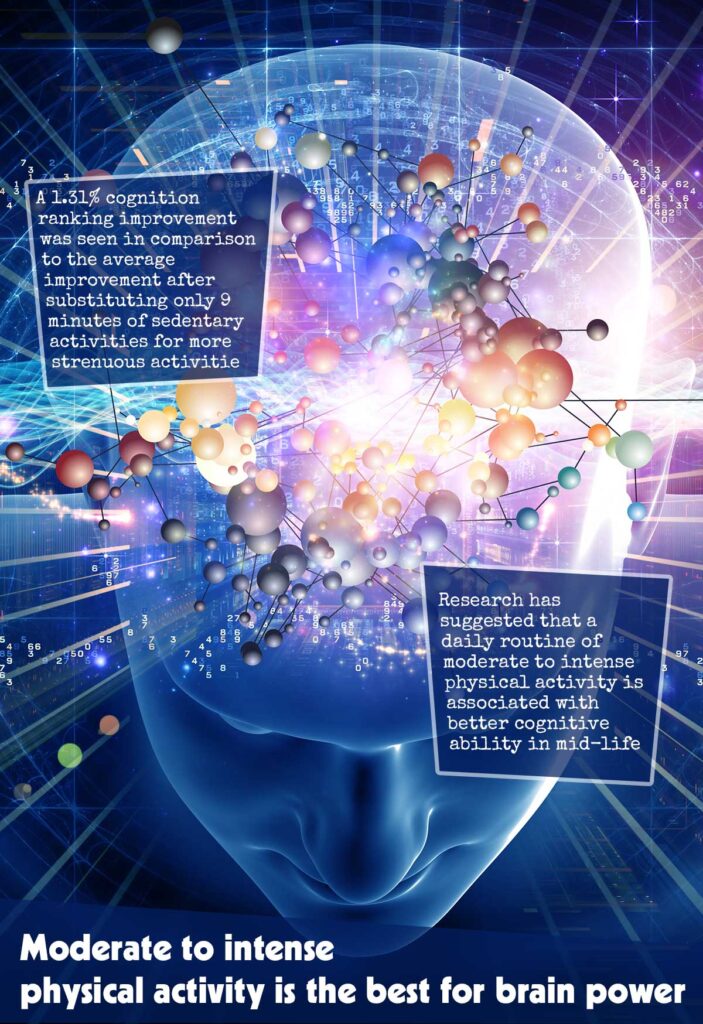Research suggests that engaging in regular moderate-intensity physical activity is linked with improved cognitive ability in midlife.
Studies indicate that moderate to intense physical activity is the best form of activity for improving working memory as well as mental processes like organization and planning. Swapping it out for 6-7 daily minutes of sedentary behavior or light intensity exercise could result in lower cognitive performance.
Research on regular moderate to intense physical activity has highlighted its many health advantages, but few studies have also considered sleeping time as being essential to wellbeing – it makes up 75% of any 24-hour day period!
To determine if moderate to intense physical activity would provide the greatest boost for midlife cognitive performance, they took a compositional approach.
This study included 8581 participants aged 46-47 from the 1970 British Cohort Study who were monitored during both childhood and adulthood for their overall health.
Participants were required to fill out detailed questionnaires about their health, background and daily lifestyle before being asked to wear an activity tracker for 10 hours each day for seven consecutive days – something which took about one hour per day overall.
To assess verbal memory and executive function, participants were administered a series of cognitive tests designed to measure immediate and delayed word recall, verbal fluency, processing speed/accuracy and processing speed accuracy. Results from each cognitive test were then combined into an overall global score that represented memory and executive function.
2959 participants who agreed to wear an activity tracker were excluded from the study due to device error, not wearing it for long enough or failing to fully complete questionnaires.
Final analysis included 4,481 individuals, with slightly over half being female. Two-thirds were married while 43% held some form of education up until 18 years of age. Furthermore, more than two-thirds reported being non-risky or occasional drinkers and 50% never smoked cigarettes.
Based on activity tracker data, individuals reported engaging in moderate to intense physical activities for 51 minutes per 24-hour period; engaging in 9 hours and 16 minutes of sedentary behaviors; performing 5 hours and 42 minutes of light intensity physical activities; as well as sleeping for 8 hours 11 minutes during that same timeframe.
Results demonstrated that more time engaged in moderate to intense physical activity was associated with improved cognitive performance when controlling for educational attainment, workplace physical activity and health issues. Once health concerns were taken into account however, the correlation between increased physical activity and improved cognitive performance diminished considerably.
Sedentary behaviors associated with light-intensity physical activity and sleep were found to have positive associations with cognitive performance, possibly as these activities provide more opportunities for engaging in mentally stimulating activities such as reading books or working instead of watching television. The associations were stronger for executive function than memory function.
Individuals with higher cognitive performance scores engaged in more moderate to intense physical activities, while those with lower scores engaged in lighter intensity activities.
Researchers conducted experiments to explore the relationship between activity and cognition by altering the amount of time spent doing various activities per minute, with moderate to intense physical activity replacing other forms of engagement, revealing increased scores overall mental performance scores.
An overall cognition ranking improvement of 1.31% was recorded when substituting just 9 minutes of sedentary activities with more strenuous ones, a positive trend which became even more pronounced as more time was taken away from sitting activities.
Substituting gentle activities for 7 minutes of sleep led to a 1.27% improvement, and vice versa; such improvements demonstrated even further progress over time.
Sedentary behavior was shown to positively impact cognition scores when combined with 56 minutes of sleep or 37 minutes of light-intensity physical activity.
Cognition rankings began to decline by 1-2% after only eight minutes of more strenuous activity were undertaken instead of sitting idly for 8 minutes, and continued its downward spiral with increased moderate and intense physical activity.
Substituting vigorous activities with 6 minutes of light-intensity physical activity or 7 minutes of sleep resulted in 1 to 2% decreases in cognition ranking; these reductions decreased with increased losses of moderate-intensity physical activity.
Activity trackers only recorded time spent sleeping, rather than its quality or duration – something which may explain the apparent correlation.
Realistically, moderate to intense physical activity usually comprises only a minor part of daily routine and can be the hardest intensity level to attain; hence any decrease in moderate-intensity physical activity time seems detrimental.
As this was an observational study, causation cannot be ascertained and context for each movement component cannot be provided via activity tracker measures.
Researchers found that this approach recognizes an essential role for moderate to intense physical activity in supporting cognition, and efforts should be taken to strengthen it as part of everyday movement.

